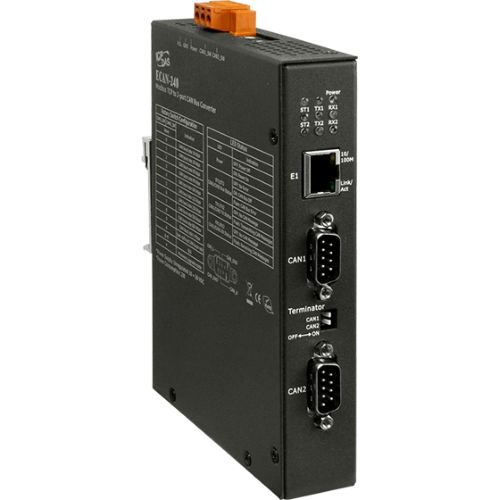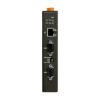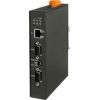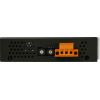ECAN-240 CR
Modbus TCP to 2-port CANBus Gateway
Hardware
- Supports input voltage 10~30VDC
- Fully compatible with the ISO 11898-2 standard
- Includes built-in DIP-switch the can be used to enable/disable the terminator resistor
- Includes an RJ-45 Ethernet interface with auto-negotiation function
- Includes two CAN bus interfaces with 9 pin D-sub connector
- Includes two rotary switches for selection of CAN bus Baud Rate
- Contains seven LED indicators, one as a power indicator and the others for monitoring CAN bus activity
- Contains LED indicator on RJ-45 for Ethernet status
- RoHS Design
Software
- Provides support for the CAN bus ID filter function
- Provides support for the CAN bus bridge mode via configuration
- Provides support for the CAN bus listen only mode via configuration
- Provides support for a range of CAN bus Baud Rate from 10k bps to 1M bps adjustable via the rotary switch
- Provides support for the Modbus TCP Client/Server function via configuration
- Provides support for TCP/UDP pair connection function via configuration
- Provides support for bootloader mode to enable firmware updates
- Provides support for web configuration functions
Web Configuration
The configuration for the module parameters or communication commands (in Modbus Client mode only) on the ECAN-240 module can be performed via a standard web browser using the embedded web configuration function. The web configuration functions are divided into several categories and includes basic configuration, CAN Bus configuration, Modbus configuration and pair connection configuration.
Note:
- The browsers are supported, including IE 8, Chrome, Opera, Firefox(recommended).
- The influence of Temporary Internet File on IE 8 will lead to work abnormally during using web configuration function. Thus, please change the setting to “every visit to the page”.
- The IE 11 and Microsoft Edge are not supported.
INTRODUCTION
The IoT (Internet of Things) has been a much discussed topic in recent years. Using the IoT concept, it is easy to integrate the environment of heterogeneous network and let all of the things into be digitized making life more convenient. In order to provide additional access to IoT applications related to industry based on the CAN bus, ICPDAS has developed a new Ethernet product, the ECAN-240.
The ECAN-240 module is a Modbus TCP to 2-port CAN Bus Gateway. As its functionality, that provides communications via the Ethernet based on the Modbus TCP industrial protocol, meaning that the module can be easily integrated with an industrial network. The ECAN-240 module includes two CAN bus interfaces, meaning that more various CAN applications can be supported, such as a CAN bridge or a CAN message router. The CAN message router function means that the ECAN-240 module can be used to connect to four different CAN networks, ensuring they can communicate with each other.
APPLICATIONS
Modbus TCP Server:
The Modbus TCP Server function is used to implement communications between a CAN device and a Modbus TCP Client. When the ECAN-240 module is acting as a Modbus TCP Server, the Modbus TCP Client needs to use Modbus commands based on the CAN format in order to access the ECAN-240 module. The ECAN-240 module will then translate these commands into CAN format messages and send them to the CAN networks. Similarly, when a CAN format message is received from the CAN network, the ECAN-240 translates the message into Modbus format, which can then be accessed using a Modbus command.
Modbus TCP Client:
The Modbus TCP Client function is used to implement communications between a CAN Bus and a Modbus TCP Server. When the ECAN-240 module is acting as a Modbus TCP Client, it can access the Modbus TCP Server via the command configuration. When the ECAN-240 module receives I/O data, it will forward it to the remote CAN devices for analysis, control, or other operations. Once configured, the ECAN-240 module is also able to access the Modbus TCP Server via a CAN message.
Pair Connection:
The Pair Connection function is used to implement communication between two ends of CAN network. CAN Network #1 can communicate with CAN Network #3 or CAN Network #4 using pair connection configuration. Similarly, CAN Network #2 can also communicate with CAN Network #3 or CAN Network #4 in the same manner. The pair connection function on the ECAN-240 module is implemented via either the TCP or the UDP protocol.
Transparent:
The Transparent option is to see as a half-pair connections. The TCP/UDP packet is in CAN format and contains the CAN ID. This is useful because it allows custom TCP/UDP programs to be developed that can directly access the ECAN-240 module for specific applications.
HARDWARE SPECIFICATIONS
CAN Bus Interface
Channels: 2
Connector: 9-pin D-sub male
Baud Rate: 10k bps to 1M bps
Terminator Resistor: Built-in 120 ohm terminator resistor, enabled/disabled via DIP-Switch
Isolation: 3 kV VDC for DC to DC, 2500 Vrms for photo couple
CAN Bus Specification: ISO 11898-2 CAN 2.0A and CAN 2.0B
Ethernet
Controller: 10/100Base-TX Ethernet Controller (Auto-negotiating, Auto_MDIX)
Connector: RJ-45 with Ethernet indictor
Protocol: Modbus TCP Client/Server, TCP, UDP, HTTP
Socket connections: 8 for TCP, 1 for UDP
LED Indicator
LED (Round): Power (1), CAN Bus Status (2), CAN Bus Tx (2), CAN Bus Rx (2)
Ethernet LED: Ethernet Status (RJ-45) (2)
Power
Power Supply: Unregulated +10 ~ +30 VDC
Protection: Reverse polarity protection, Over-voltage brown-out protection
Power Consumption: 0.08 @24VDC, 2W
Mechanical
Installation: DIN-Rail
Dimension (W x L x H): 106.8mm x 146.8mm x 25.9mm
Environment
Operating Temperature: -25 to +75°C
Storage Temperature: -40 to +80°C
Relative Humidity: 10 to 90% RH, Non-condensing






